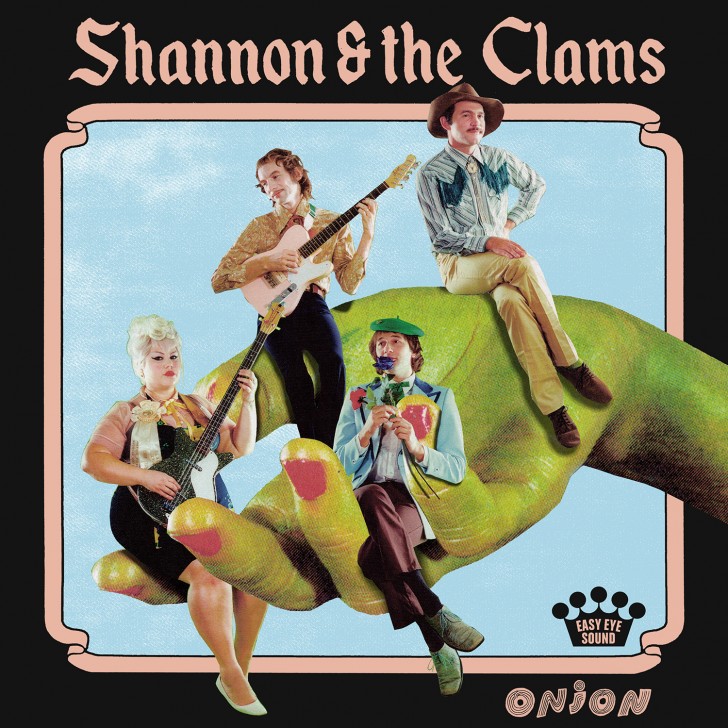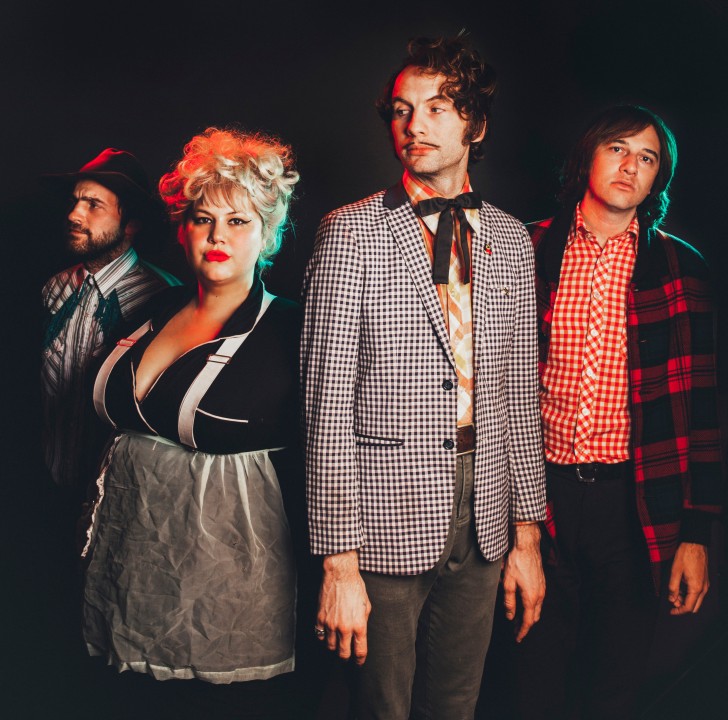Imagine walking into a beachside diner in the 1960s, ordering a frothy chocolate milkshake, and sliding a nickel into the jukebox. Outside the windows, the waves off the California coast crash and recede against the golden sands. Guitar riffs and illustrious vocals delivered by a 21st century singer summoning James Brown and Etta James seep from the speakers. Throw in some jazz organ and misty instrumentation, and you’ve envisioned the basis of Shannon & the Clams.
The Oaklandian foursome released their fifth studio album, aptly titled Onion, in February. According to Shannon Shaw—the “Shannon” portion of the halfway eponymous organisation—the record marks a pivotal thematic and lyrical moment in the band’s near-ten year career.

“As I was unearthing and examining all these parts of myself, it just made me think of an onion,” she tells us. “You just keep peeling the layers, and it just goes on…So it’s a metaphor for this journey of looking inward and problem-solving oneself.”
Shaw continues, “Onion is representative of this maybe-cliché, maybe-not journey of self-investigation, looking inward and trying to work on myself and take care of myself, because I’ve never really done that before.”
Black Keys frontman Dan Auerbach’s Nashville-based record label Easy Eye Sound released Onion, and Auerbach himself helped with the production. Auerbach also tapped Shannon & the Clams to open for him on a nationwide tour that, it just so happens, arrives in Boston at the House of Blues this Sunday.
While Shaw’s songs delve into her real-world experience, the same cannot generally be said about tracks penned by guitarist Cody Blanchard, who alternates lead vocals. “Cody’s songs are usually these fairytale-esque songs that are just playful and don’t really have any deeper meaning,” she explains. But Blanchard’s traditionally fun-loving sensibilities took a more emotional turn on Onion. “Me and Cody have been going through some rough personal stuff, and I think all the songs on Onion are representative of that.”
Following two back-to-back, critically-acclaimed successes with 2013’s Dreams in the Rat House and 2015’s Gone By The Dawn, Shannon & the Clams’ latest release showcases how far the band has come since their inception in 2009. “For this album, we got to really stretch our wings and experiment to the fullest,” Shaw says. “Every song [from Onion] is just so showing of all our most vulnerable parts.”
Onion carries on the band’s reputation for beachy harmonies, inhabiting their niche cove of signature surf rock intonation. Shannon & the Clams possess a distinct capacity for crafting unique tunes that’re nonetheless firmly rooted in time-honored rock ‘n roll traditions. Shaw believes this essential component comes naturally at this point in their career. “When you overthink something, you can feel it’s not genuine. I can usually tell [when I need to say] ‘This is too contrived.’ That’s one thing that’s helped our band get by and stay genuine and heartfelt—the ability to see that something isn’t natural. That’s really important to me, because the music I love to listen to is genuine and heartfelt, and I would like to make the kind of music I’d want to listen to.”
Shaw obsessed over music as a child, but didn’t grow up taking her affinity for making up songs seriously. Quite the opposite of seriously, in fact. “My parents would tease me that every time I’d sit on the toilet potty-training, I’d be singing ‘Stop in the Name of Love,’ that Supremes song,” Shaw says with a laugh. “[Music] was the way I always dealt with getting in trouble. I’d just sit in my room making up songs. The first song I ever remember writing, or more just coming up with…I think I was five and I wrote a song about how my mom wasn’t actually my mother but an evil witch.”

Even as a teenager, Shaw was not the type to fantasize about rock ‘n roll stardom. Playing bass wasn’t even her idea, at first. “I got a bass guitar when I was 15 from a high school boyfriend, and it was a nice gesture and a really nice gift, but I was just like, ‘Why did he give me this, what am I supposed to do with this?’ I didn’t think I was special or cool enough to be one of those people who played instruments.”
Unbeknownst to Shaw at the time, that bass guitar would spark a long musical career complete with a globe-spanning fanbase. She brought it with her to college, then on a move to Oakland, California, playing very little along the way.
That was, until she experienced a life-altering breakup shortly after arriving in the Bay Area at the age of 24. “I was suddenly living alone, poor, lonely, depressed, and the bass stood out to me for some reason. I picked it up and started messing around. Then I wrote a song. Then another one. It was a lonely hobby that became an obsession.”
Eventually, Shaw’s brother encouraged her to start singing at open mic nights, which segued into an invitation from Blanchard to play a friend’s house party. According to Shaw, “I was so embarrassed to play alone that I got a band together.”
And so, Shannon & the Clams came to be.
The Clams experienced some minor lineup changes in the beginning, as groups typically do. Today, the quartet also includes Blanchard, Nate Mahan on drums and Will Sprott on keyboards, with both providing supporting vocals.
“Nate and Will helped play a huge role in the studio, having these great ideas [for Onion] and being multi-instrumentalists themselves. They really helped flush out some of Cody and I’s ideas.”
Shaw also plays bass and provides supporting vocals in Hunx and His Punx, but Shannon & the Clams obviously don’t need to harp on their association with an incrementally more famous band (especially one that’s been more-or-less inactive for a while). Onion stands as a testament to Shannon & the Clams’ clout, which works out nicely for Shaw, who can’t picture doing anything else.
“We’ve been a band for almost ten years now, just slowly climbing this mountain, hanging onto our integrity and appreciating and loving our roots. But I want to go further. I don’t know where that is.”
We don’t know where that is either, but we’re excited to find out.
(Article quotes are from our ArtsEditor interview.)
